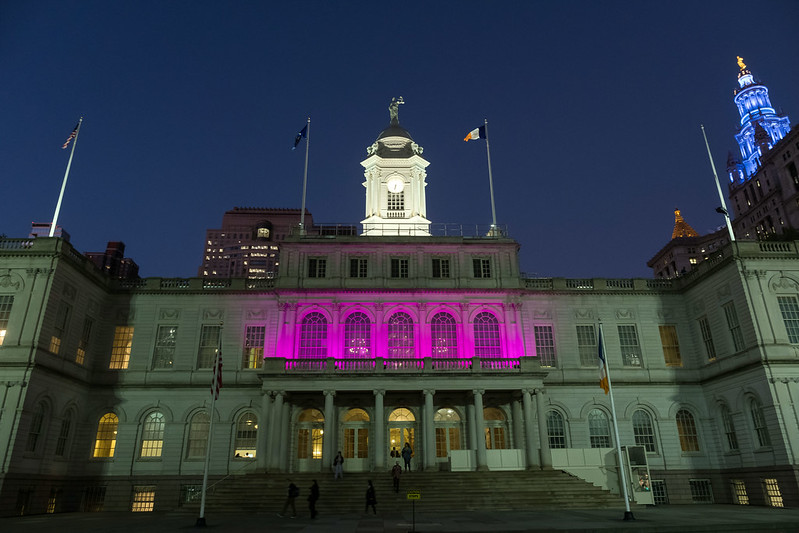
City Hall in purple (photo: Ed Reed/Mayoral Photography Office)
One survivor used the word “red” in telephone calls with her best friend when she and her children were in trouble. A family living with an abuser placed a photo in a window visible from the street – when the photo was not visible it meant they were in trouble. Another survivor signaled for help with a special knock on the wall shared with a next-door neighbor.
As a domestic violence survivor said in “When Staying Home Isn’t Safe,” one of my recent ThriveNYC podcast episodes, “If you can’t be strong, be brave. Go get help.” In her case, she left her partner after the smacks turned into punches. Survivors break through isolation in many ways, as the above anecdotes show.
Domestic Violence Awareness Month is marked every October but COVID-19 has changed everything this year. There have been surges in suspected and reported domestic violence nationwide since the pandemic, with a 19% uptick in calls to New York’s domestic violence hotline since April compared to last year. A New England Journal of Medicine article called domestic violence during COVID-19 “a pandemic within a pandemic” because of a cascade of relationship stressors -- crowded housing, unemployment, illness, isolation, remote schooling and work.
In this moment of protests for racial equality and a higher profile for social justice movements, now is the time for all New Yorkers to become allies in the fight to end domestic violence, which touches 1 in 4 women and 1 in 10 men. Like so many social ills, domestic violence cuts across all demographic lines, exacerbated by factors like racism, homophobia, citizenship status, and poverty.
We can all do much more than wear purple on October 22, a day historically dedicated to raising domestic violence awareness.
Be an “upstander” not a bystander. Learn the signs of domestic violence and abuse by going to our NYC Hope website, and memorize and share the phone number of the domestic violence hotline: 1-800-621-HOPE (4673) to connect to services.
The ThriveNYC helpline at 1-888-NYC-Well is also available 24/7 to talk, text, or chat with trained counselors in almost every language. It is a free and completely confidential place to talk about whatever is on your mind. The city’s Family Justice Centers (a one-stop shop for survivor services) closed temporarily because of the pandemic but services are available by telephone.
Still active is the city’s network of services and assistance for survivors: shelters, food delivery, legal assistance, reimbursement for tele-health mental health services. Links to those services are on the city’s domestic violence support page.
These strange, unprecedented few months have been a time to learn what we can do better. Survivors have told city officials that during the COVID-19 crisis they urgently need survivor-led spaces for peer-to-peer support. So for the first time ever, the city is supporting a series of public, virtual Survivor Town Halls in every borough, with two planned for Domestic Violence Awareness Month. One is on October 15 in Manhattan and one is October 28 in Brooklyn.
Notably, the town halls are organized with grassroots organizations like the Voices of Women Organizing Project, the lead initiative of the Battered Women’s Resource Center.
These 90-minute Zoom calls are an opportunity for networking, story-telling, and resource-sharing with fellow survivors and representatives of such key city agencies as the Administration for Children’s Services, the Department of Education, and the Department of Health and Mental Hygiene. Among topics to be discussed are financial survival, being undocumented, family court, mental health, and staying safe online.
Cecile Noel, Commissioner of the Mayor’s Office to End Domestic and Gender-based Violence (ENDGBV), emphasizes that allies must listen to what survivors need and be respectful of their choices, which might include staying with the person who has abused them.
There is always hope and there is always help. We need every New Yorker to join us in this battle for equality, dignity, and life. In a time of rampant uncertainty, isolation and fear, we are stronger by standing together. As the marches and social justice protests across the country have shown, we can share a different vision for how we treat one another, even in our own homes and our most intimate relationships.
***
Chirlane McCray is First Lady of New York City. On Twitter @NYCFirstLady.
***
Have an op-ed idea or submission for Gotham Gazette? Email This email address is being protected from spambots. You need JavaScript enabled to view it.




